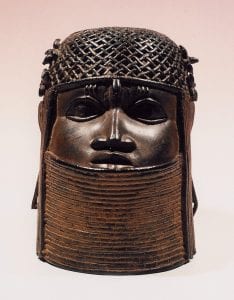Next steps in our repatriation journeys…
Posted on by Fay Curtis.
by Lisa Graves, curator of World Cultures
Updated April 2023.
The good news is we have been able to return the Cree coat to Canada. We first told you about this in early 2020 but on 13 October 2021 it finally left Bristol on its journey home.
Read more about its return in the official press release.
It was an emotional day for me saying goodbye. Knowing how much it will mean to the Indigenous people today living in the lands where it was created is very powerful. This departure represented a new type of return. The decision was not about human remains, looted or restricted secret/sacred material. It was about the cultural value the coat still holds for its originating communities.
Discussions between myself and staff at Aanischaaukamikw Cree Cultural Institute (ACCI) began around 2017/18. Despite it taking almost four years, this was a relatively quick turn-around in the world of museum repatriations as it is so important to make sure all permissions and agreements are formally completed.
 In December 2020 I blogged about another potential repatriation from our collections. This Benin bronze head has indirectly been part of national claims stretching back decades.
In December 2020 I blogged about another potential repatriation from our collections. This Benin bronze head has indirectly been part of national claims stretching back decades.
In early 2020, after virtual contact from a member of the Court, we started seriously investigating the request. Although we have still not been able to make contact directly with Royal Court officials, we have been looking at the work of the British Museum and the Benin Dialogue Group and discussing options with the Legacy Restoration Trust. To be clear, we are not bound by the thoughts or decisions of any of these bodies, nor the UK government.
We have been gathering information about the best way to take on board the variety of thoughts and concerns of different groups in Nigeria. There has been a lack of consensus about the best place to hold objects that return to the country. The new, but yet to be built, Edo Museum of West African Art is one option that many do agree with.
Individual returns have recently been made to West Africa, to the care of the National Commission for Museums and Monuments of Nigeria. These high profile cases have taken the time and resources of the main stakeholders in Nigeria so we have been waiting to see what would be the best way forward from their point of view.
In the meantime, we have returned the three Benin bronze plaques, that have been on display at M Shed, to the lender, the British Museum. They were displayed in the Transatlantic Slave Trade gallery in a case looking at Africa before the slave trade. It is not easy to represent pre-colonial Africa using our colonial collections. We are therefore taking our time to refit this case and wish to call on artists and historians of African heritage to help us.
Repatriation doesn’t always have to involve physical return, especially at the start of the process of engaging with communities. We are currently involved in sharing information about our Pacific, North American and Australian collections with projects working directly with source communities.
We are also participating in an international project called Devolving Restitution, working through current ideas and plans for African collections in the UK. As we circulate more information on what we hold across the world there may be more calls for returns, or joint ownership models, or just for better access.
At the very least we hope any such contacts will provide more opportunities to connect people with their heritage wherever they are.
UPDATE – During 2022 we were in contact with representatives from NCMM. They were due to visit in April ’22 but in the end their busy itineraries couldn’t allow for that. They have become even busier in recent months due to the increased amount of global returns, and pledges to return, that have taken up their time. They have concentrated their efforts with larger institutions but we await direction from them on what they would like to happen next in the Bristol case.